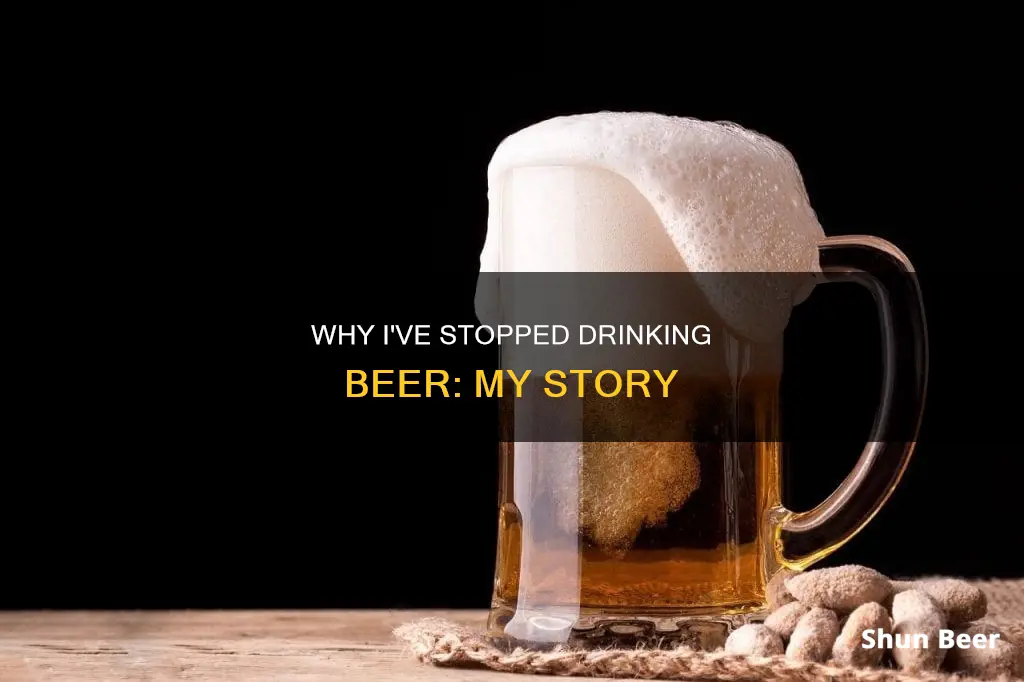
There are many reasons why someone might decide to stop drinking beer. For some, it may be a matter of health, as beer intolerance or allergy is a real condition that can cause symptoms such as bloating, upset stomach, fatigue, inflammation, and anxiety. For others, it may be a lifestyle choice, as cutting out alcohol can lead to increased productivity, improved physical and mental health, and better financial decisions. Additionally, as people age, their alcohol tolerance tends to decrease, and they may find that they cannot drink as much beer as they used to. Whatever the reason, giving up beer doesn't have to mean giving up socialising, as there are plenty of other drink options available, such as hard cider or seltzer.
| Characteristics | Values |
|---|---|
| Reasons for not drinking beer | Allergic reaction, acid reflux, psychological reaction, age, lifestyle change, medication, alcohol intolerance |
| Feelings after drinking beer | Fullness, bloating, inflammation, fatigue, anxiety, brain fog, upset stomach, diarrhoea, swollen eyes |
What You'll Learn

You might have an allergy or intolerance
If you can no longer drink beer, you may have an allergy or intolerance. Beer allergies are rare, but they can be dangerous. If you experience symptoms such as hives, sneezing, or wheezing, you should avoid that beer and consult a doctor.
Allergies
Beer contains a variety of ingredients, and you may be allergic to one of them. The most common allergens in beer are gluten, histamine, sulfites, and yeast. Other possible allergens include grains such as wheat, barley, or sorghum, as well as assorted colorings, flavorings, and preservatives.
If you have a beer allergy, your immune system treats one of these ingredients as harmful and creates antibodies to fight it. Symptoms of a beer allergy include:
- Abdominal pain and bloating
- Tightness of the chest
- Hives
- Wheezing
- Anaphylaxis
If you experience any of these symptoms, seek immediate medical attention.
Intolerances
Alcohol intolerance is a genetic condition in which the body cannot break down alcohol efficiently. It is more common in people of Asian descent. Symptoms of alcohol intolerance include:
- Fast heartbeat or palpitations
- Stomach pain
- Nausea or vomiting
- Worsening of asthma symptoms
- Stuffy or runny nose
- Skin flushing
If you have a mild intolerance, you may be able to manage it by limiting your alcohol intake or avoiding certain types of alcoholic beverages. However, if you have a severe reaction, consult a medical professional.
Diagnosis and Treatment
If you think you have a beer allergy or intolerance, you should see a doctor or allergist. They can perform a physical exam, discuss your medical history, and conduct allergy testing to determine the cause of your symptoms.
The only way to prevent reactions to beer is to avoid drinking it or to choose beers that do not contain the ingredient causing your symptoms.
Shanghai's Public Drinking Laws: Beer Allowed?
You may want to see also

You're experiencing inflammation
Inflammation is your body's natural response to injury or infection. When your body detects a threat, such as harmful bacteria, viruses, or damaged tissue, it initiates an inflammatory response to eliminate the threat and promote healing. While inflammation is typically a good thing, chronic inflammation can lead to several health issues.
Alcohol acts as a catalyst for inflammation, triggering your body's inflammatory response. When you drink alcohol, your body metabolizes it into acetaldehyde, a toxic chemical that causes oxidative stress and cell damage. Here are some ways in which alcohol consumption can lead to inflammation:
Gut Microbiome Disruption
Alcohol disrupts the balance of good and bad bacteria in the gut microbiome, allowing harmful bacteria to proliferate. This imbalance, known as dysbiosis, causes inflammation in the gut, triggering systemic inflammation that can lead to gastrointestinal, cardiovascular, autoimmune, metabolic, and neurological diseases.
Oxidative Stress
Alcohol metabolism generates an excess of reactive oxygen species (ROS), leading to oxidative stress, an imbalance of harmful free radicals and beneficial antioxidants in the body. Oxidative stress triggers inflammation and contributes to the development of heart disease, respiratory diseases, neurological diseases, and cancer.
Increased Gut Permeability
Alcohol consumption increases the permeability of the intestinal lining, allowing bacterial toxins called lipopolysaccharides (LPS) to leak into the bloodstream. This triggers the release of pro-inflammatory proteins (cytokines), leading to low-grade systemic inflammation and an increased risk of inflammatory diseases, including obesity and diabetes.
Immune System Suppression
Alcohol weakens the immune system, reducing its ability to fight bacterial and viral infections and effectively regulate inflammation. Chronic inflammation can lead to a weakened immune system, making it difficult for your body to fight off infections and diseases.
Joint Inflammation and Pain
Joint pain and stiffness are common symptoms associated with alcohol-induced inflammation. This is partly due to dehydration caused by alcohol consumption, as cartilage requires hydration to protect the joints effectively. The gut bacteria imbalance and inflammation can also contribute to joint pain, as well as increased uric acid levels in the blood, which can lead to permanent damage to joints, bones, tendons, and ligaments.
Alcohol-Induced Liver Inflammation
Alcohol-induced gut inflammation is closely linked to liver disease. The toxic compounds produced during alcohol metabolism can directly harm the liver, triggering an inflammatory response. Additionally, increased intestinal permeability allows inflammation-inducing substances to reach the liver, causing further damage.
Reversing Alcohol-Induced Inflammation
Reducing alcohol consumption or abstaining from alcohol is the most effective way to reduce inflammation. If you continue to drink, staying hydrated and consuming anti-inflammatory foods can help combat the inflammatory effects of alcohol. Additionally, getting adequate sleep, managing stress, and incorporating relaxation techniques can also help reduce inflammation.
Making healthy lifestyle choices, such as improving diet, exercising regularly, and reducing stress, can help reduce chronic inflammation and improve overall health.
Drinking Beer in Ads: Is It Legal?
You may want to see also

You're feeling anxious
It's completely normal to feel anxious from time to time. However, if you're feeling anxious after drinking alcohol, you may be experiencing what's known as "hangxiety". This is a phenomenon that manifests as intense feelings of anxiety following drinking. Hangxiety can start just a few hours after drinking and can affect anyone, although it is more common in women, people prone to anxiety, and shy folks.
Alcohol affects the levels of neurotransmitters in your brain, including serotonin, dopamine, and gamma-aminobutyric acid (GABA). Initially, alcohol increases the activity of these neurotransmitters, promoting relaxation and boosting self-confidence. However, as alcohol wears off, the levels of these neurotransmitters drop sharply, which can lead to heightened anxiety.
- Monitor your alcohol intake: The more you drink, the more your brain reacts to the dose of alcohol, so try to stick to one or two drinks if you can.
- Identify your motivation for drinking: Are you drinking to relieve stress or because you're genuinely enjoying time with friends? If it's the former, try finding alternative activities that make you feel better in the moment and the next day, such as spending time with friends without drinking, exercising, or reading a book.
- Practice mindfulness: Try meditation, grounding activities, calming yoga poses, or deep breathing exercises to work through hangxiety.
- Take care of your physical needs: Drink water, eat nutritious meals, and get enough rest to help your body and mood recover from a hangover.
- Get some exercise: Physical activity can boost and normalize neurotransmitter activity in the brain, including GABA, so consider going for a walk or a light workout if you're up for it.
- Stay hydrated: Alcohol is dehydrating, so make sure to drink water or other clear liquids to help your body and cognition recover.
- Eat before and during drinking: Having food in your system can help prevent nausea and upset stomach.
- Get enough sleep: Give your body ample time to rest and recover after drinking.
When to seek help
If you're experiencing persistent anxiety or difficulty controlling your alcohol consumption, it's important to seek professional help. Alcohol misuse can worsen underlying mental health conditions over time, and there are treatment options available to address dual diagnosis care for anxiety and alcohol use disorder.
Beer Foam Stones: Do They Work?
You may want to see also

You're becoming less social
If you're becoming less social, it could be due to a variety of reasons, and it's important to reflect on your feelings and motivations to understand the cause.
Firstly, it's natural to experience fluctuations in your social drive over time. There may be periods when you feel more inclined to socialise and others when you prefer solitude. This can be influenced by various factors, such as your current life stage, work or personal commitments, or even seasonal changes. For example, during summer breaks, individuals may experience a drop in their social tolerance as they have more opportunities to socialise. It's okay to embrace these fluctuations and adjust your habits accordingly.
However, if you feel concerned about becoming less social, there could be underlying reasons that contribute to this shift. One common factor is the influence of social media. While it connects us, excessive screen time can also hinder our real-life interactions and make us feel less inclined to initiate conversations or form new connections. Social media can create a sense of superficial connection, giving the illusion of social fulfilment without the depth of face-to-face interactions.
Additionally, it's important to consider your motivations and attitudes towards socialising. Are you content with your level of social interaction, or do you wish for more? Less-social individuals may find themselves in an "annoying middle ground," where they desire a more active social life but lack the motivation to initiate change. They may be comfortable with solo hobbies and feel fulfilled by their own company, making it challenging to push themselves to socialise. This can lead to a lack of motivation to form new friendships or maintain existing ones, as the effort required may seem daunting or unnecessary.
Furthermore, being less social can impact your interpersonal skills and confidence over time. Socialising requires practice, and the less you engage, the more challenging it may become. This can create a vicious cycle where you socialise less, and the rewards of social interaction diminish, leading to further avoidance. It's essential to be mindful of this potential consequence and actively work on building and maintaining social connections.
Lastly, it's worth considering whether there are any underlying insecurities or anxieties that may contribute to your decreased social drive. Socialising can be exhausting, especially for those who are naturally more introverted or selective about their company. Reflect on whether you are comfortable in your own skin and if there are any personal challenges you're facing that might impact your desire to socialise.
Remember, it's okay to embrace your natural temperament and enjoy solitude if that is what you truly desire. However, if you feel that becoming less social is hindering your well-being or preventing you from achieving your social goals, it may be beneficial to work on developing your social skills and pushing yourself gently outside your comfort zone.
Crafting Gin and Ginger Beer Cocktails at Home
You may want to see also

You're prioritising health
You're Prioritising Your Health
It's great that you're taking the time to reflect on your drinking habits and how they might be impacting your health. Making informed choices about your health is always a good idea, and it's important to listen to your body and prioritise your well-being.
Reasons for Not Being Able to Drink Beer Anymore
There could be several reasons why you can't drink beer anymore, and it's important to consult a medical professional to get a proper diagnosis. Here are some possible explanations:
- Alcohol intolerance: Alcohol intolerance is a genetic condition where the body struggles to process alcohol correctly. This can lead to a build-up of acetaldehyde, a toxic chemical that causes unpleasant symptoms. People of East Asian descent are at a higher risk for alcohol intolerance due to differences in the enzyme that breaks down acetaldehyde.
- Allergy to a specific ingredient: You may be allergic to an ingredient in beer, such as hops, barley, or gluten. Allergies to specific ingredients can develop at any point in life and can cause allergy-like symptoms such as hives, itching, facial swelling, or difficulty breathing.
- Age-related changes: As people age, their bodies may process alcohol at a slower rate due to decreased enzymes that break down alcohol. This can result in increased intoxication and a higher risk of accidents or injuries.
- Medication interactions: Certain medications can increase sensitivity to the side effects of alcohol, making it more difficult to enjoy drinking without unpleasant consequences.
- Health conditions: In rare cases, sudden alcohol intolerance or allergic reactions to alcohol could be a sign of an underlying health condition, such as Hodgkin's Lymphoma.
Prioritising Your Health: Next Steps
If you're experiencing negative side effects from drinking beer, it's important to take action to prioritise your health:
- Consult a medical professional: Discuss your symptoms with a doctor or allergist to get a proper diagnosis and rule out any serious health conditions. They can help determine if you have an alcohol intolerance, allergy, or another condition.
- Consider alternatives: If beer doesn't agree with you, there are plenty of other options to explore. You can try gluten-free drinks like cider or wine, or experiment with different types of alcohol to see what works best for your body.
- Listen to your body: Pay attention to the signals your body is sending you. If drinking beer consistently leads to negative side effects, it may be time to cut back or stop drinking altogether. Prioritising your health and well-being is always the best choice.
- Seek support: If you suspect you have an alcohol use disorder or are struggling to cut back, don't hesitate to reach out for help. Organisations like Zinnia Health offer comprehensive treatment options and support to help you reclaim your life from alcohol.
Remember, it's always a good idea to listen to your body and make informed choices about your health. Prioritising your well-being will empower you to live a happier and healthier life.
Beer Mail: Shipping Alcohol Straight to Your Doorstep
You may want to see also
Frequently asked questions
As people get older, their bodies become less able to process large amounts of alcohol and it takes longer to recover from its effects. According to the National Institute on Aging, the effects of alcohol consumption change as people age. Bodies can begin to process alcohol at a slower rate due to decreased enzymes that break down alcohol.
Extreme bloating, discomfort, or an upset stomach are some of the more obvious warning signs that you have a beer allergy. Other signs include fatigue, inflammation, anxiety, and diarrhoea.
If you can no longer drink beer, you could try switching to gluten-free alternatives such as cider or wine, or gluten-free beer.







